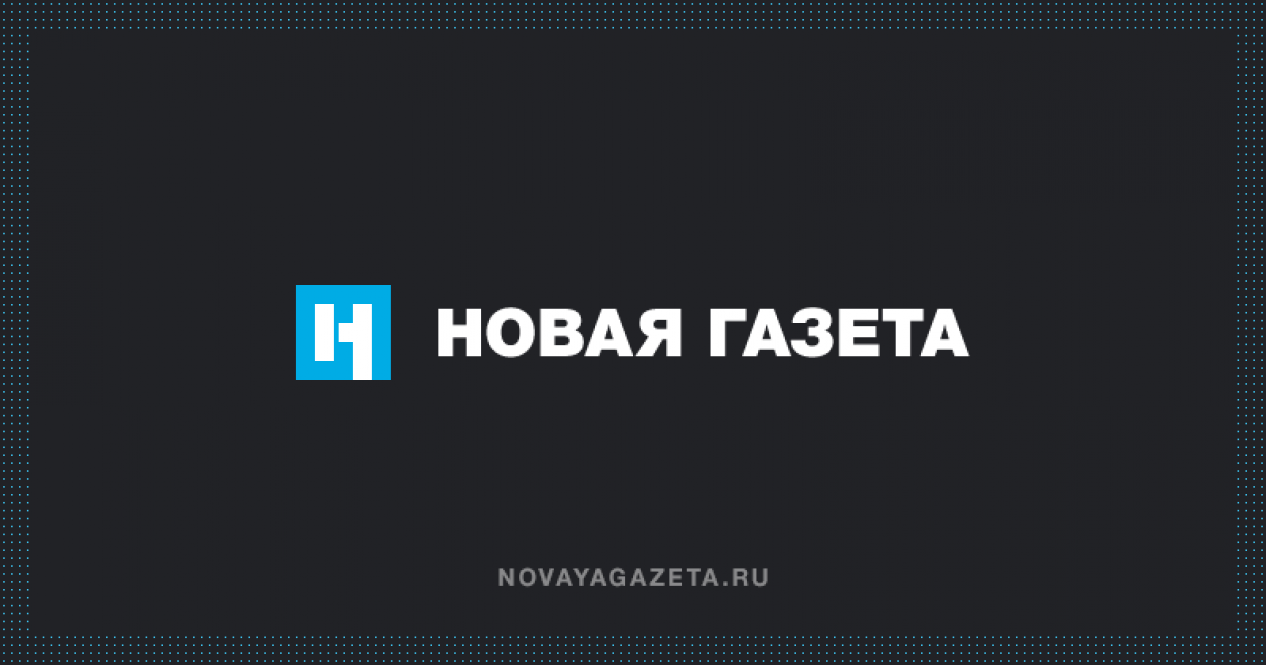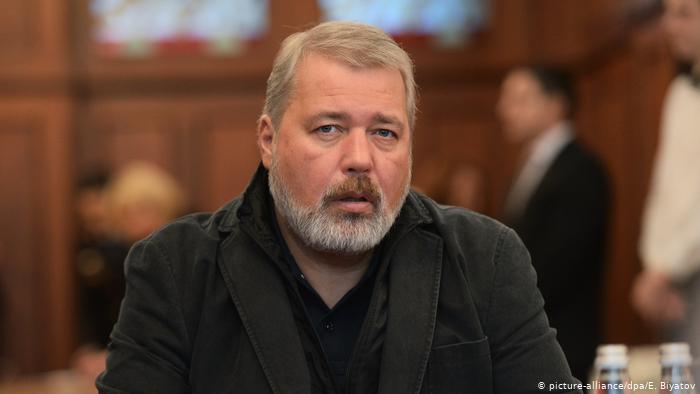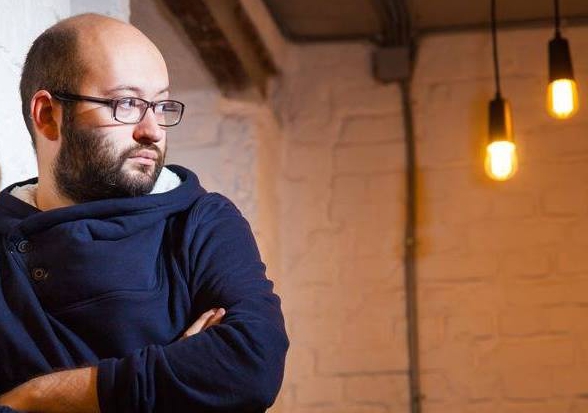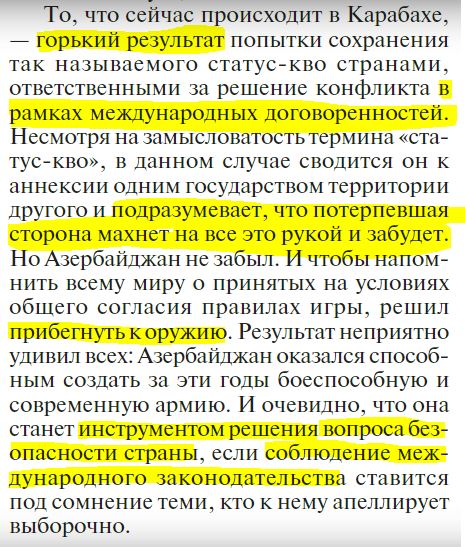
“It became known that the editor-in-chief of Novaya Gazeta newspaper, Dmitry Muratov, was awarded the Nobel Peace Prize. The case is that the Nobel Peace Prize was awarded to the head of a newspaper that deals not with objective coverage of events or analysis, but with provocations. The case is that during the 44-day war in 2020, Novaya Gazeta was engaged in open anti-Armenian propaganda (...),” Infoteka24, the Armenian media outlet, reports.

The publication reminds that it was “Novaya Gazeta” journalist Ilya Azar who was deprived of the accreditation of the Armenian Foreign Ministry for his anti-Armenian activities, while many other foreign journalists risked their lives just to bring the truth about Azerbaijan’s atrocities to the world.
“Knowing this, the decision to award the Nobel Peace Prize to the editor-in-chief of a newspaper that sided with the aggressor and the war can be regarded as a slap in the face of justice(…). It is obvious that the world needs to reconsider its values,” Infoteka24 reports.

Editor-in-chief of Novaya Gazeta Dmitry Muratov won the Nobel Peace Prize for 2021. The prize was awarded “for efforts to protect freedom of speech and expression, which are fundamental to democracy and lasting peace.”
Muratov told RIA Novosti that he will transfer part of the prize money to the Circle of Kindness charity fund, which helps sick children. This fund was created in early 2021 by Russian President Vladimir Putin. Funds from the increased tax of Russian citizens, who earn more than 5 million rubles a year, are sent there.
Faktyoxla Lab. has tried to figure out how plausible the statements of the Armenian media about the anti-Armenian activities of “Novaya Gazeta” are.
To begin with, firstly, the special correspondent of Novaya Gazeta, Ilya Azar, really covered the Second Karabakh war and was sent to Karabakh. Ilya Azar made several reports from the scene, but in early October, the Armenian Foreign Ministry canceled his accreditation after a high-profile reportage from Shusha and Lachin. The publication regarded the actions of the ministry as interference in journalistic activities and interrupted Azar’s business trip.
For example, here is what Ilya Azar wrote about in his article “The War at the South Gates”:
- The losses of the Armenian side are much greater than those announced;
- the soldiers lack weapons and uniforms;
- Azerbaijan is trying to move the front line as far as possible before an imminent truce, etc.
On December 9, 2020, Novaya Gazeta reported that the then spokesperson for the Armenian Foreign Ministry Anna Naghdalyan contacted Azar. The journalist was demanded to “remove the information about the servicemen who were in the bombed cultural center of Shusha - as allegedly untrue - from the report ‘War at the Southern Gates,’ published in Novaya Gazeta.”
“Azar refused, because he was confident in the reliability of this information, however, he offered to supplement the material with a comment from the Foreign Ministry. After that, our special correspondent was repeatedly summoned to the Armenian Foreign Ministry in order to ‘discuss security issues.’ According to some information, he was threatened with the revocation of accreditation and even deportation,” the newspaper said. The intervention of the Armenian ambassador to Russia, who contacted the editor-in-chief and promised to influence his colleagues, didn’t change the situation, the newspaper added.
“The Armenian Foreign Ministry took away the previously issued accreditation card and forbade me to engage in journalistic activities. The official reason was because I entered Karabakh without accreditation, although initially the Foreign Ministry issued me, just like other journalists, accreditation specifically for working in Karabakh. Allegedly, the procedure of accreditation subsequently was changed, and they informed me about that (via e-mail) [...] The unofficial (and the main) reason, was my yesterday’s (October 7) report from Shusha and Lachin, which, according to the Foreign Ministry spokesperson, caused a negative public response (which is true),” Ilya Azar wrote on his Facebook page on October 8.
Azar noted that there are no false facts in his article. “The opinions of people are not a priori facts, the information from officials is given in the article (I suggested yesterday to add the Foreign Ministry’s comment specifically on the cultural center. I understand that the text touched the patriotic feelings of Armenians and the Azerbaijanis liked it, but I will say again that this is just a report: it contains people who express different opinions, including fiercely patriotic ones,” the journalist wrote. He added that since 2011 he has been a non grata person in Azerbaijan for visiting and working in Karabakh.That is, Ilya Azar didn’t engage in anti-Armenian propaganda, but wrote the truth, which was subsequently proved on almost every point.
Secondly, on October 18, 2020, Novaya Gazeta published a text by Azerbaijani journalists Rushana Huseynova and Alakbar Mammadov entitled “Karabakh uncensored” under the heading “Comments”, which is a balanced analysis of what is happening, based on an international legal approach to the problem.

A note from the editor was placed under the article: “Novaya Gazeta doesn’t support any of the parties to the conflict in Nagorno-Karabakh and calls for an immediate cessation of hostilities. We offer the representatives of the Armenian side, if necessary, to respond to this text - in the same calm and civilized tone.”However, three days later, by order of the editor-in-chief of the newspaper, Dmitry Muratov, this text was removed from the Novaya Gazeta website, and instead a statement by Muratov himself appeared, in which he explained his decision to censor an article by his Azerbaijani colleagues: “I consider it inadmissible for one-sided opinions on the situation around Karabakh, such as “Karabakh uncensored” to appear on the pages and the website of “Novaya Gazeta.” The editors removed it from the site, but in the paper version this mistake will remain forever. The authors representing the side of the conflict directly approve of the use of weapons and differently interpret international documents. This is while the editorial board, instead of studying the situation through the eyes of only its correspondents, gives the floor to one side, and even invites to discussion. (…) I apologize for the editorial error. Now only negotiations about peace. A negotiating table is better than a memorial table. If the current politicians cannot stop in mutual extermination - pass the question on to the next generations. Maybe they will be smarter after all.”
Thus, taking into account the above-mentioned facts, we come to the conclusion that the statements of the Armenian media that Novaya Gazeta was engaged in open anti-Armenian propaganda are groundless.




















